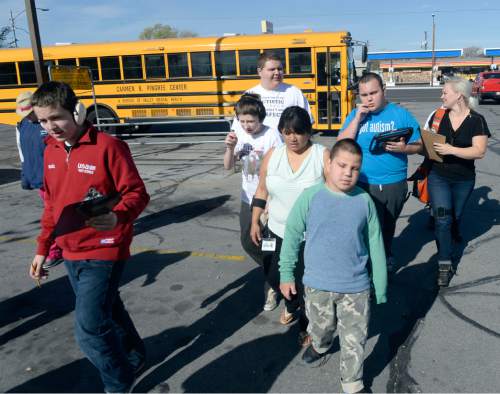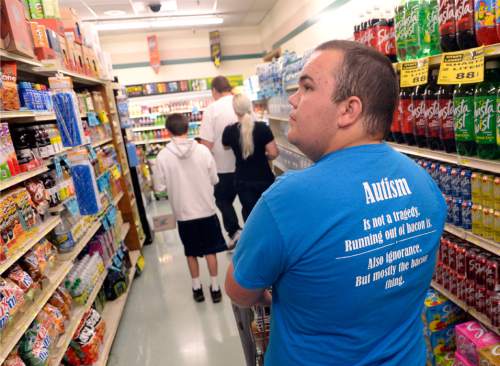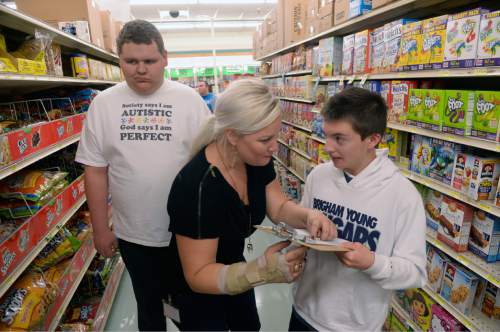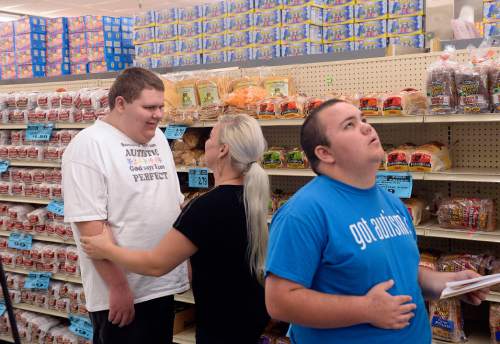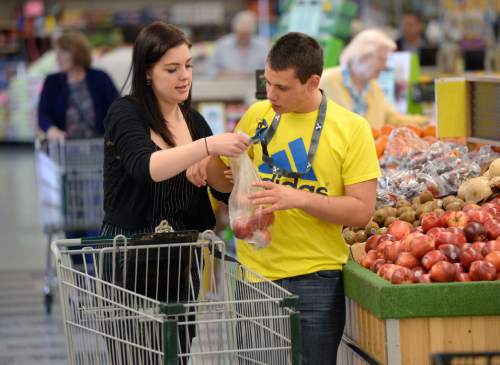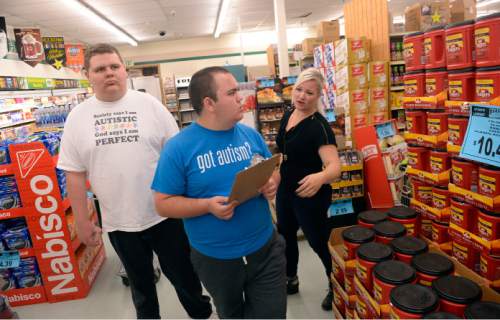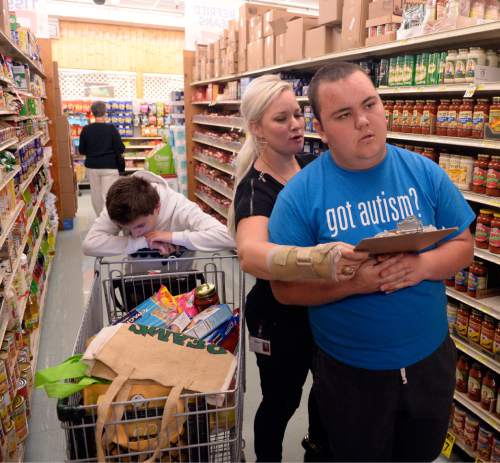This is an archived article that was published on sltrib.com in 2015, and information in the article may be outdated. It is provided only for personal research purposes and may not be reprinted.
It's Tuesday, and that means teens from the Carmen B. Pingree Autism Center of Learning are shopping at Reams Food Store on State Street.
The three cruising the aisles with lead teacher Markell McCubbin — Sam, Gavynn and Carson — have just picked out the generic cereal version of Lucky Charms ($5.77) and consult their shopping list.
Oreos are next on the list, and they need three bags, ordered by teachers back at school.
"We're going to find those Oreos. Do you see them behind you?" McCubbin asks. "Carson, turn your eyes," she instructs the 15-year-old, who slowly maneuvers the shopping cart out to the main aisle.
Up strolls Charlie, who has progressed enough in the year since Pingree started the Getting Ready for Our World (GROW) program that he now shops on his own.
"Do you need help?" Charlie asks.
"Charlie!" McCubbin says. "I might give you a dime when we get back to school. That was so kind! Do you want to give Carson a hint if you've seen any Oreos around here?"
The moment is a perfect distillation of what McCubbin is trying to do here: She's teaching these boys — young men, really — how to find what they need in a store, how to read price tags, how to communicate and how to be aware of other people so they don't run them down with a cart.
Charlie gets two dimes when the kids return to their Pingree classroom, and McCubbin explains that his offer of help was "huge."
"It's hard to think beyond yourself when you're a kid, especially if you struggle with empathy and social skills. "[Charlie's gesture] was huge for me," she says. "Those are the things I keep coming back for."
—
Utah's autism rate is among the highest in the nation. The Centers for Disease Control and Prevention put Utah's rate at 1 in 54 children (it's 1 in 68 nationally), based on 2010 data on children age 8 in three northern Utah counties. If that rate holds true for children throughout the state today, there are close to 18,000 Utahns 19 and younger with autism spectrum disorder.
Carmen Pingree Center was among the community's early responses to the growing number of children with autism. It opened for preschoolers in 2002.
Over the years, as students aged, the center expanded its elementary program. It was a natural progression to add a program centered on preparing children to become adults.
The 10 students — nine boys and one girl — in the GROW program range in age from 12 to 17. Pingree has 150 younger students in its autism program.
But that number could triple in the coming year because the Legislature just set aside $500,000 to buy and equip two portable units. They will go up this summer in the empty field west of the school on Salt Lake City's east bench.
By fall, the adolescents will be in their own spaces, which will be equipped with a full kitchen, laundry and bedroom, so the students can learn to cook for themselves, wash clothes and make beds. There will be room for socializing and working on vocational skills.
"We were really looking at that transition into adulthood and how to … help them be successful, happy adults," says Julia Hood, the managing director of the center, which is operated by Valley Behavioral Health.
Jessica Kerr says the GROW program has helped her 15-year-old son Nathan be happier at home, more sociable and able to know what to do in public.
"My son wants to be big so badly," Kerr says. "It means the world to him, because he's not being treated like a little kid."
McCubbin, her teaching aide and three assistants take the students out in public often. They go hiking up Emigration Canyon, where the students take photos with iPod Touches or iPads from the school. They ride public transportation to museums. They celebrate birthdays by going to frozen-yogurt shops, where the six who are mostly nonverbal can use iPads equipped with language software to tell the clerks what flavors they want.
When the students return to the school from Ream's each week, they spread out about $300 worth of groceries, bag them up according to each teacher's list and deliver them to the classrooms.
Among each week's groceries are ingredients for their own Friday lunch, which they make together in the classroom.
"[Nathan's] with his peers and he's hanging out with kids his own age, and it's made all the difference for him," Kerr says.
—
The parents have another name for the program, says Cheryl Smith, Carson's mother. "It's Markell High," after the teacher.
It's been good for parents to see how much independence their children can attain if it's expected of them, she says.
"As parents, we continue to do things for our kids and we don't stop and think about it," Smith adds. "I help put his shoes on, but why?"
The whole point of the Pingree Center is to intervene when children with autism are young so they have the skills to move into traditional schools, typically in special-needs programs. The goal is always to have children in the least restrictive program in which they can flourish.
Carson has been at Pingree since preschool, but is mostly nonverbal and can exhibit severe behavioral issues, so he can't be in a traditional school, says his mother, who was among those urging legislators to approve funding for the new GROW portables.
It was Smith's earlier lobbying that led the Legislature to create the Carson Smith Special Needs Scholarship in 2005.
The scholarship gives parents $7,500 a year to pay tuition to a private school that can give their children with special needs more attention. Some 700 children with a variety of special needs use the scholarship at 42 different schools.
This winter, the Legislature passed a bill, SB270, to extend the scholarship to 3- and 4-year-olds.
Since the GROW program started, Carson, who turns 16 next month, has begun emptying the dishwasher at home and is learning to cope with stress by focusing on his breathing and by making lists, his mother says.
She and McCubbin hope the new portables, which may be configured to look more like a home, will provide the space for vocational training for students who are higher functioning.
And, they figure the portables eventually could help Pingree move to the next frontier: programs for adults with autism, who will soon explode in number. "That's our goal," Hood says.
Funding will be a problem, Smith acknowledges. There's not enough to go around, and the state has rightly focused on early intervention.
"The wave is coming," she says. "They are all growing up. We are not ready for them."
Twitter: @KristenMoulton Pingree fundraiser
The Carmen B. Pingree Autism Center of Learning is about one-third of the way toward its goal to raise $75,000 for iPads so that every student can have one.
Many children with autism are nonverbal, and the iPads can be loaded with language software that "speaks" for the child with the touch of a finger. The school has other uses for iPads as well.
The campaign started in March and ends in the fall.
More information is available at GoFundMe: http://goo.gl/42Rdcs ›


